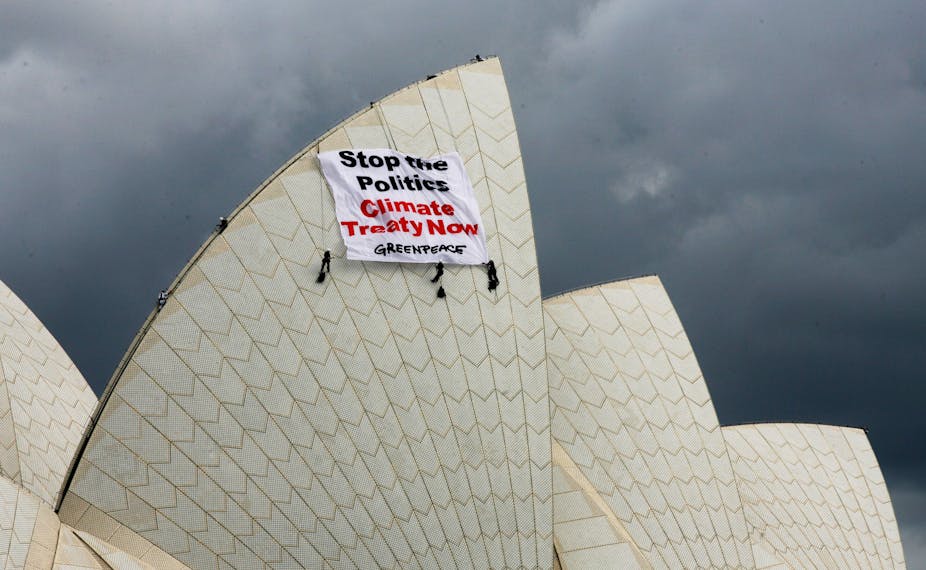Environmental activists and mining protesters are now being labelled as terrorists, with reports security agency ASIO is spying on conservation groups protesting at coal mines.
Resources and Energy Minister Martin Ferguson said the protest activity at energy facilities could perhaps have “life-threatening” and “major trade and investment implications”.
Documents have confirmed the Australian government is exploring ways to better utilise the security and intelligence community in order to support the coal and energy sectors in handling climate change activists.
But are protest groups who might disturb energy infrastructure within Australia a genuine national security threat – a sort of home-grown, green-tinted al-Qaeda?
And in a free society, how far should society extend the mandate of the intelligence sector to monitor environmental and conservation groups?
Terrorists or protesters?
Shortly after the reports in the Fairfax media, the Australian Mining website ran a story with the provocative title - “Green groups are worse than terrorists: Government”.
Green groups have responded with a mix of shock and outrage. Some argue that the label “terrorist” has become improvised political rhetoric, a trigger for anything to inspire public backlash and justify heavy-handed retaliation.
Others claim that security resources are being pointlessly wasted in expanded attempts to quash democratic demonstrations.
Australian Greens Senator Scott Ludlam stated that it was “a deliberate abuse of the role of Australian security agencies, who have better things to do than follow the dictates of foreign coal and energy corporations”.
In contrast, supporters argue it is clear that ASIO does have an important role to play in real-time surveillance of citizens and their activities. Particularly when there is the potential for industrial sabotage and the physical destruction of critical infrastructure.
Security officials have also been cited as expressing concern about future plans by environmental groups to “disrupt and delay” coal and energy industry development. More broadly, “knowing your enemy” to assist decision-making options in government has been viewed as obligatory to “winning” the so-called war on terrorism.
Genuine risk?
But a key question is whether green groups involved in public protests in Australia should be isolated as a real or potential terrorist-type risk that might be prone to violent campaigning? Critically how should such a threat assessment be constructed?
Certainly, the relationship between intelligence and policy is complex and delicate. And the term terrorism itself does remain a highly emotive and subjective term.
In a post-9/11 world, there has been an immense political pressure to drastically alter the environment in which intelligence operates. As part of this shift, executive branches now have less rigid oversight, while methods of intelligence and policing have been hardened. This has been echoed in a wide range of democratic nations.

Indeed, after 9/11, there has been no shortage of pressure on policy leaders to push to reclaim “lost” executive security powers and promoting a reorganisation of intelligence duties.
A matter of trust
But past events have shown us that the public can not always trust executive conduct or the executive’s relationship with the security sector.
The history here has been troubled to say the least. Public trust has been exploited to reflect a tale of legal ambiguity, managerial breakdown, negligence in standard procedures and domestic human rights abuses.
Of course, since the Cold War, unauthorised operations are virtually non-existent in liberal democracies. But there is no doubt that the reliability of executive power and related public support for the intelligence community remains a highly contentious issue.
Alarm bells were raised during bipartisan investigations into intelligence operations and constitutional rights in both America and Australia during the 1970s and 1980s. In that period, an ambitious policy platform for offensive security strategies and target hardening had been badly undermined - particularly due to legislative backlash and media investigations after Vietnam and Watergate.
US intelligence, for example, had actively harassed and constrained political “enemies”, civil society groups and social dissenters engaged in lawful political activities. Such intelligence activity included the monitoring of university professors, anti-Vietnam War protesters and civil rights activists such as Reverend Martin Luther King Jr.
In the words of then US Senator Frank Church, an intensification of surveillance on citizens was being “collected and disseminated in order to serve the purely political interests of an intelligence agency or the administration, and to influence social policy and political action”.
Cause for concern
Today, the responsibility should remain wirh the policymaker - the consumer of intelligence - to resist falsely classifying information while also setting and managing security priorities that are based on credible risk assessments.
We should remember the words of US Senator Wyche Fowler. He argued that a balance of power that was distributed to democratic institutions was meant to keep politicians on their toes, and “bureaucrats from doing something stupid”.

